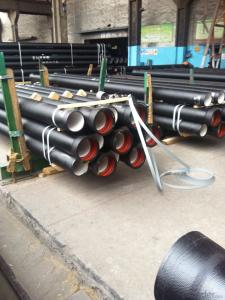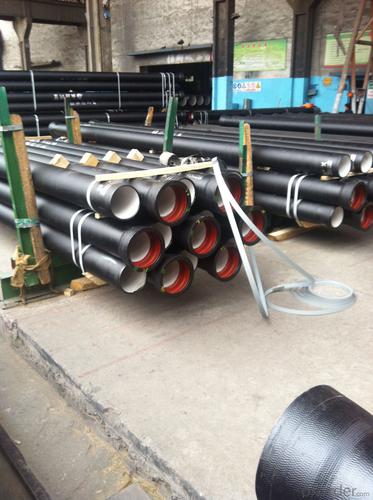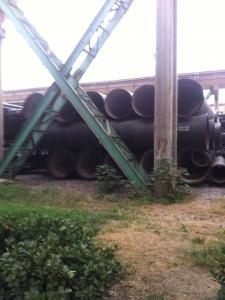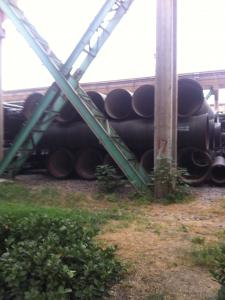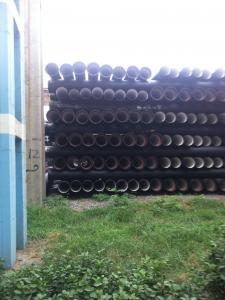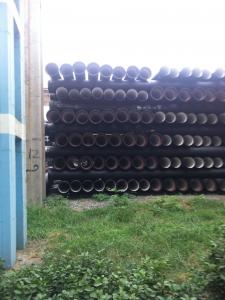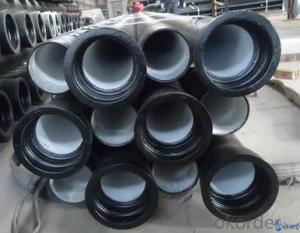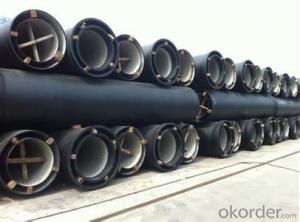DUCTILE IRON PIPES AND PIPE FITTINGS K9 CLASS DN200
- Loading Port:
- Tianjin
- Payment Terms:
- TT OR LC
- Min Order Qty:
- 22 pc
- Supply Capability:
- 3000 pc/month
OKorder Service Pledge
OKorder Financial Service
You Might Also Like
Material : Ductile Cast Iron
Size Range : DN 80mm to DN 2000mm
Unit Effective Length : 6m or 5.7m
Manufacture Standard: ISO 2531:1998/ EN 545:2006/EN 598:2007
Annual capacity : 200,000 tons
Coating Exterior: Zinc 130g/m2 according to ISO 8179-1 and bitumen coating 70 microns.
Cement Interior: Portland Cement/ High Alumina Cement/ Sulphate Resisting Cement Lining according to ISO 4179
Special requirements on external coating and internal lining can be applied
We also provide accessories such as SBR/EPDM rubber gaskets, lubricant paste, pipe caps, PE sleeves, etc.
Additional Parts:
Each pipe is strictly inspected according to related standard to ensure permanently high performance.
Easy Installation at site and service free for life
Long Service Lifespan
Quotation will arrive you within 24hours once we get your inquiry.
We guarantee offering you a competitive price.
A copy of original inspection reports of pipes will be offered after shipment.
Photos of loading process will be sent to the customer after shipment effect.
We will follow-up the delivery progress after shipment effect and update to the customer on weekly basis.
- Q: How does ductile iron pipe perform in areas with high soil settlement?
- Ductile iron pipe is known for its exceptional performance in areas with high soil settlement. Due to its inherent strength and durability, it can withstand the pressures exerted by settling soil without compromising its structural integrity. The flexibility of ductile iron pipe allows it to accommodate ground movements caused by soil settlement, thus minimizing the risk of pipe failure or damage. Its ability to adapt to these movements helps prevent cracks, leaks, and breaks that could occur in more rigid pipe materials. Moreover, ductile iron pipe's strong resistance to corrosion provides an added advantage in high soil settlement areas. It can withstand the corrosive effects of the soil and other environmental factors, ensuring the longevity and reliability of the pipe system. In areas with high soil settlement, ductile iron pipe is often the preferred choice due to its ability to handle ground movements without sacrificing performance. Its strength, flexibility, and resistance to corrosion make it an ideal solution for maintaining a robust and efficient water distribution system even in challenging soil conditions.
- Q: What is the lifespan of ductile iron pipe?
- Various factors, such as pipe quality, installation environment, and maintenance practices, can influence the lifespan of ductile iron pipe. On average, this type of pipe typically lasts between 80 and 100 years. This impressive longevity can be attributed to the inherent durability and strength of ductile iron, enabling it to withstand high pressure, external loads, and environmental conditions. Moreover, ductile iron pipe is often coated with protective linings, such as cement mortar or epoxy, to enhance its resistance to corrosion and extend its lifespan. Regular inspections and maintenance also play a crucial role in prolonging the life of ductile iron pipe by promptly identifying and addressing potential issues. Ultimately, with proper installation, maintenance, and care, ductile iron pipe can provide a reliable and long-lasting service for several decades.
- Q: How to control mortar proportioning in ductile iron pipe cement coating
- The calculation steps are: first to calculate the amount of plastering engineering (area), and then check the "national construction basic quota" quota in the corresponding amount of mortar project, engineering quantity multiplied by the amount of mortar that fixed amount of mortar, the mortar amount multiplied by the corresponding mix ratio of mortar, the consumption of raw materials can be obtained.
- Q: What is the expected pressure rating for ductile iron pipes?
- The pressure rating for ductile iron pipes can differ based on factors like pipe diameter, wall thickness, and specific application. In general, ductile iron pipes are built to endure high-pressure situations. They are frequently utilized in water and wastewater systems, where they can normally manage pressures ranging from 150 psi to 350 psi or more. To ensure safe and dependable operation, it is crucial to refer to the manufacturer's specifications or relevant industry standards for precise pressure ratings based on pipe size and application.
- Q: Are ductile iron pipes resistant to chemicals?
- Generally, ductile iron pipes exhibit resistance to chemicals. Ductile iron, a variety of cast iron, is fortified with small amounts of magnesium to enhance its strength and ductility. This alloying process effectively heightens its ability to withstand corrosion and chemical attack. Ductile iron pipes have found extensive use in multiple applications, such as water supply, wastewater treatment, and industrial piping systems, where they may encounter a range of chemicals. Nevertheless, it is crucial to acknowledge that the resistance of ductile iron pipes to chemicals can vary based on the specific type and concentration of the chemical in question. Thus, it is advisable to seek guidance from the manufacturer or a qualified engineer to ascertain the suitability of ductile iron pipes for a particular chemical application.
- Q: Can ductile iron pipes be used in oil or gas transmission pipelines?
- Ductile iron pipes are applicable for oil or gas transmission pipelines. They belong to the cast iron category and possess enhanced characteristics, including increased tensile strength and ductility. These properties make them suitable for various applications, including pipeline systems used in oil and gas transmission. The corrosion resistance of ductile iron pipes is exceptional, which is crucial for pipelines that transport oil or gas over long distances. This material exhibits a high resistance to external factors such as soil chemicals, moisture, and corrosive gases commonly found in the oil and gas industry. Moreover, ductile iron pipes can endure high pressures and temperatures, making them suitable for the demanding requirements of oil and gas transmission. Moreover, ductile iron pipes have excellent impact resistance, enabling them to absorb and withstand external forces such as ground movement or heavy loads. This durability ensures the integrity and longevity of the pipeline system, minimizing the risk of leaks or failures. In summary, ductile iron pipes provide a reliable and cost-effective solution for oil and gas transmission pipelines. Their robustness, corrosion resistance, and ability to withstand high pressures and temperatures make them a viable choice for this critical infrastructure.
- Q: Can ductile iron pipes be made of flexible waterproof sleeves?
- Flexible waterproof casing is suitable for pipeline through the wall in vibration or by strict waterproof requirements of the structures of hardware fittings, general production enterprises according to the Construction Science Research Institute developed S312, 02S404 standard atlas manufacturing. The wall of flexible waterproof casing wall, in case of non concrete should be replaced by concrete walls, and a casing must be solidified on the wall; flexible waterproof casing application widely used in construction, chemical industry, iron and steel, tap water, sewage treatment and other units.
- Q: Can ductile iron pipes be used for fire protection systems?
- Yes, ductile iron pipes can be used for fire protection systems. Ductile iron pipes have excellent strength and durability, making them suitable for carrying water and withstanding the pressure required in fire protection systems. Additionally, they have good corrosion resistance, which is crucial for long-term use in fire protection applications.
- Q: Are ductile iron pipes resistant to environmental stress cracking?
- Yes, ductile iron pipes are resistant to environmental stress cracking. Ductile iron is a type of cast iron that has been treated with trace amounts of magnesium to improve its strength and ductility. This treatment makes ductile iron pipes highly resistant to cracking and damage caused by environmental stressors such as temperature fluctuations, soil movement, and corrosive elements in the surrounding environment. Additionally, the inherent strength and flexibility of ductile iron allow it to withstand high levels of external pressure and stress without cracking or failing. Overall, ductile iron pipes are a durable and reliable choice for various applications, including water and wastewater transportation, due to their resistance to environmental stress cracking.
- Q: Do ductile iron pipes require special maintenance?
- Indeed, special maintenance is necessary for ductile iron pipes. Despite their reputation for being strong and durable, ductile iron pipes are still vulnerable to specific types of corrosion. To prevent corrosion and extend the pipes' lifespan, regular maintenance is crucial. This maintenance typically involves conducting periodic inspections to identify any signs of corrosion or damage, as well as implementing cleaning and protective coating procedures. Furthermore, it is important to handle and install the pipes correctly to maintain their integrity. By regularly maintaining the pipes and adhering to industry best practices, one can prevent leaks, breaks, and other issues, ultimately saving valuable time and money in the long term.
Send your message to us
DUCTILE IRON PIPES AND PIPE FITTINGS K9 CLASS DN200
- Loading Port:
- Tianjin
- Payment Terms:
- TT OR LC
- Min Order Qty:
- 22 pc
- Supply Capability:
- 3000 pc/month
OKorder Service Pledge
OKorder Financial Service
Similar products
Hot products
Hot Searches
Related keywords
